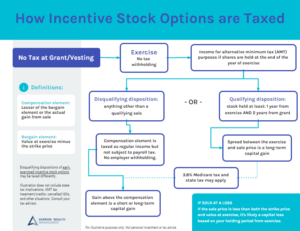Giving appreciated stocks can be a great way to maximize your gift to charity and your tax benefits. When you donate cash, you’re giving after-tax dollars. It may reduce your income tax liability if you itemize deductions, but if not, there’s no benefit.¹ But when you give an appreciated stock, you avoid paying capital gains taxes entirely and receive a tax deduction for the donation if you itemize. In the right situations, donating stock to charity can have lasting tax benefits – aside from the intangible value of furthering a cause that’s important to you.
How to donate stock to charity using a donor-advised fund
A donor-advised fund is perhaps the most streamlined way to donate appreciated securities. Donor-advised funds can be set up easily at some of the major institutions (e.g. Schwab, Fidelity) or with the help of your financial advisor. When you make an irrevocable donation to your donor-advised fund, you receive a tax deduction for the market value of the asset.
The deduction is available (potentially) in the current tax year as an itemized deduction. You will also not have to pay capital gains tax on the appreciation. More on the tax benefits of giving stock to charity later.
When a stock is donated to a donor-advised fund, it’s sold. The fund receives cash which you can reinvest or leave in cash. Donors have full control as to the timing and charitable recipient of funds, if it’s an IRS-qualified public charity.
In another words, donating stock to charity with a donor-advised fund (DAF) is a two-step process. Funding your DAF is step one, and this sets the amount that qualifies for a tax deduction. The second step is distributing the gift from your donor-advised fund to the actual charity itself. These two steps don’t need to happen in the same tax year.
Are stock donations tax deductible?
If you itemize your tax deductions, you can take a charitable deduction for the fair market value of the asset, up to 30% of AGI. There is a five-year carry forward for unused deductions. Only long-term securities are eligible (e.g. holding period of over one year).
The tax benefits really depend on how much the asset has appreciated relative to your cost basis. Without meaningful capital gains savings, you may be better off with cash donations in some situations. For positions with losses, it’s usually better to sell the stock, realizing the loss (hopefully to offset other gains), then donate cash. Publicly traded and non-publicly traded assets qualify, though the latter requires an independent valuation. This increases the cost of giving.
Who should consider donating stock?
You can give a wide range of assets using a donor-advised fund. This includes publicly traded stocks, bonds, and mutual funds, to real estate and shares in a closely-held business. For individuals with a significant amount of stock options or equity-based compensation from their employer, a donor-advised fund may be a great opportunity to accomplish charitable goals.
Typically, shares from vested restricted stock units or awards, or shares from an exercise of non-qualified stock options (NSOs) held for over one year provide the greatest tax benefits when donated to charity over other forms of equity compensation.
Individuals experiencing sudden liquidity should also consider donating stock if they’re charitably inclined. A large taxable windfall can create a lot of headaches. For example, after selling a business or having stock options cashed out after a merger or buyout, you may have few ways to reduce your tax bill.
For example, suppose you’re in the 37% tax bracket and expect to be in a 24% bracket in future years. Making a large gift in the current year could save 13% on every dollar donated. And that’s assuming you benefit from itemizing in future years, which you might not.
Other ancillary tax benefits include possibly avoiding the 3.8% Medicare surtax, loss of other tax deductions/credits, or facing higher Medicare Part B and D premiums.
A donor-advised fund isn’t the only way to give back, though. Consider these other tax-saving gifting methods.










